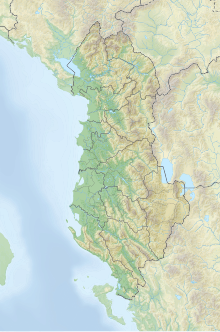Zla Kolata

| Zla Kolata Kolata e Keqe | |
|---|---|
| Зла Колата | |
 Zla Kolata from northeast | |
| Highest point | |
| Elevation | 2,534 m (8,314 ft)[1] |
| Prominence | 54 m (177 ft) |
| Isolation | 0.81 km (0.50 mi) |
| Listing | Country high point |
| Coordinates | 42°29′06″N 19°53′50″E / 42.48500°N 19.89722°E[1] |
| Geography | |
| Location | Albania - Montenegro border |
| Parent range | Accursed Mountains, Dinaric Alps |
Zla Kolata (Serbian Cyrillic: Зла Колата) or Kollata e Keqe (Albanian: Kollatë e Keqe) is one of the highest peaks of the Accursed Mountains, on the border of Albania and Montenegro.[2]
Description
[edit]Zla Kolata has an elevation of 2,534 metres (8,314 ft), making it the highest mountain in Montenegro, and the 16th highest in Albania.[3][4] It is located on the border of the Gusinje municipality of Montenegro and the Tropojë district of Kukës County, Albania. Zla Kolata has an enormous summit and is a popular tourist destination in both countries. Standing half a kilometre to the northeast at 2,528 metres (8,294 ft), only slightly lower, is Kolata e Mirë or Dobre Kolata, also located on the border. The highest peak on this massif is a kilometer east-southeast of Zla Kolata and is completely on Albanian soil; it is called Rodi e Kollatës or Maja e Kollatës.[5] It rises to 2,552 m (8,373 ft); but despite the dramatic views into the Valbona Valley, is not as often visited.
References
[edit]- ^ a b "Maja Kolata" on Peakbagger Archived 22 July 2017 at the Wayback Machine Retrieved 27 September 2011
- ^ summitpost.org Archived 26 January 2018 at the Wayback Machine Summitpost claims incorrectly that this peak lies entirely within Montenegro. Retrieved 27 September 2011
- ^ Crolla, R.; McKeating, C. (2014). Europe's High Points: Reaching the summit of every country in Europe. Cicerone Press. p. 241. ISBN 978-1-84965-960-4. Retrieved 3 September 2018.
- ^ Abraham, R. (2018). The Peaks of the Balkans Trail: Montenegro, Albania and Kosovo. Cicerone Press. p. 87. ISBN 978-1-78362-556-7. Retrieved 3 September 2018.
- ^ "Retrieved 19 January 2017". Archived from the original on 11 January 2015. Retrieved 3 September 2018.



